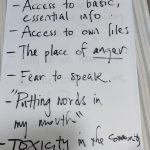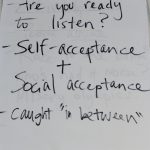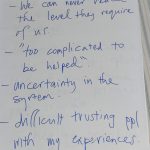Here are quick links to the resources
we created during this project!
Careleavers on national TV in Malta talking about why careleaver advocacy is important: Careleavers face obstacles and stigma but have a lot to contribute.
ONE TV Malta, November 2022
https://one.com.mt/hajtu-nbidlet-tkellem-quddiem-400-ruh-u-gie-fostered/
NET News, Malta, November 2022
Ħidma miż-żgħażagħ biex titneħħa l-istigma fuq tfal fostered
What are the current important themes that we want to advocate for?
Theme 1: Voices of children, youth, and careleavers
Voices of children being heard more in decisions that affect their lives
Care leavers have a lot of insights to offer to the system – experience, knowledge, supports to younger people, as social workers, as youth workers, as policy makers.
Theme 2: After care transitions
After care – we should include help to find and keep employment and further education. To have a mentor
Aftercare needs more supports – formal and informal, mental health, information, rights and welfare, housing, benefits,employment
Social network is really important – social exclusion is real and also stressful.
Mental health is a common issue for care leavers -especially when they may process their childhood in their early adulthood.
Aftercare is inconsistent – both within the country and also across the countries.
Stigma of careleaver experience
When we have a problem, people assume it’s because of our care experience history and not because it can be a general shared social issue (for example unemployment).
Care leavers have a lot of insights to offer to the system – experience, knowledge, supports to younger people, as social workers, as youth workers, as policy makers – this
deserves to be valued.
A change of system culture and general social awareness of the complexity of careleavers situation is needed.
You can be a care leaver and be a professional – it’s a false duality.
Systems issues
Structural level
Lack of funding impacts system design and delivery – at national or regional level or
individual level.
Inconsistencies in service provision because of funding at local level – differences based on location (“post-code lottery”).
Matching is not done. Resources or design means that matching doesn’t happen – whether
it’s availability or diversity of placements, it’s not happening, which can lead to more trauma or more placements which adds more trauma – the system is constantly responding instead of planning. This can also create more residential placements too.
Workers and carers are also not as supported by the system, it’s not only about care leavers not being supported – so is the system working at all if everyone is in crisis or close to crisis?????
Residential care is a very clinical setting and not diverse so this should be more diverse
Mentality within the system
Lack of informed workers/decision makers – institutionalised thinking – proper training for child centred communication.
[linked to this next one]
Implementation of good laws or policies is limited by mentality, capacity or education.
Communication and rights for all people – that support can also be in small groups. Support networks can help address this. That the people in the system need to communicate more and collaborate with a clear purpose of benefiting the child.
Lots of good people in the system who are well meaning and intentioned but the workforce needs to be open to new ideas and changes – some people are stuck in their ways or not changing. – is this a system design issue?
What’s the focus/purpose of the system?
Better care planning
Child and family centred – consider the trauma informed care
More money and that money is spent well (and in the right place at the right time).
Make sure there’s diversity in the care options based on the needs of the children and young people who need the services. Look at how money is spent – look at prevention/family support, look at aftercare, look at preventing trauma, and providing services.
If you would like to see how careleavers from 3 European countries (Malta, UK and Netherlands) decided on these 4 themes as representing their life experience and the 3 care systems, click here to download the report.
IFCO asked us to add to their position paper on Family Based Care:
AND we also had a lot of fun! Here are some photos of our time together during the project.


Here are some examples of the work we did together
At every meeting, including the online seminars between meetings, we were constantly thinking of our key messages, what we want decision-makers to know about us and about being in care.
It’s clear that everyone has a role to play in the system of care – including careleavers!
One of our members gave a good anaology: Pretend that the care system is a bakery, the social services are the bakers and the children in care and their families eat the product the bakers create (bread – the care system). If you really want to know how the bakery works, if it makes good bread – who do you ask? The bakers? No! You need to ask those who eat that product every day. That’s why it’s so important to include careleavers in the system (bakery planning).
See these pictures below for more information. You can also email ifco@ifco.info if you want more information about this project.








Thanks to funding from Erasmus+, IFCO partnered with National Foster Care Association Malta (NFCAM) and Careleavers Connected in the Netherlands, to undertake our European based project was co-designed and co-led by Careleavers.

